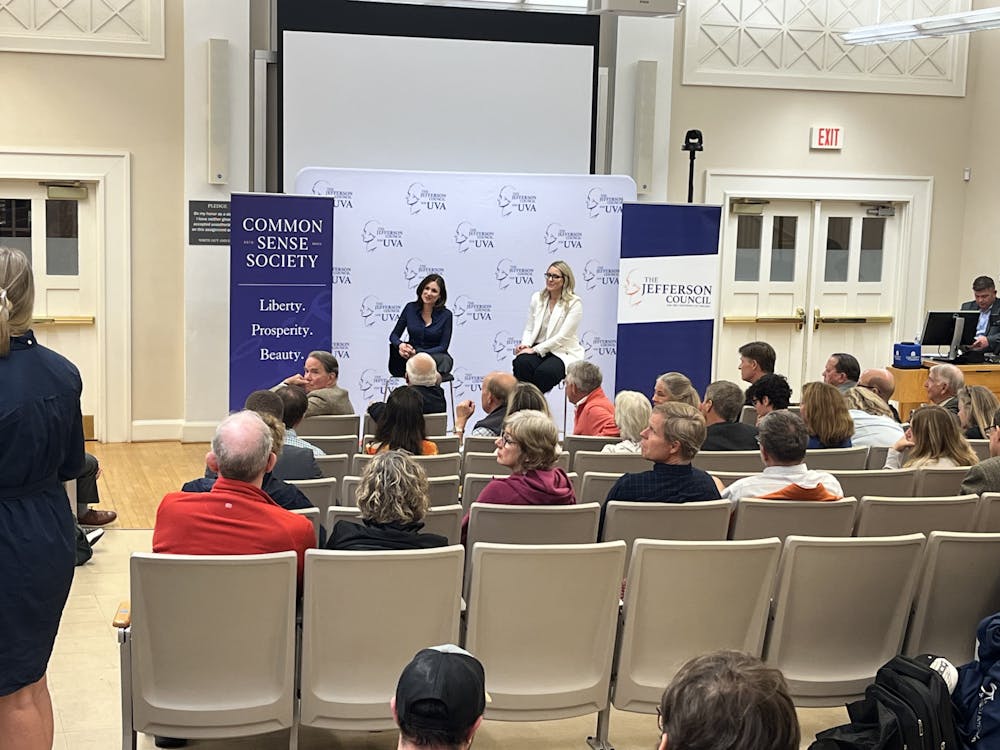Author and journalist Abigail Shrier spoke at Minor Hall this Wednesday about transgender youth, calling it a “peer contagion” that mainly affects young white girls from upper-middle-class American families. She also fielded audience questions about the scientific merit behind her research and writing.
Outside of the building, Shrier’s visit was met with a counterprotest that had over a hundred people in attendance, chanting loudly enough to be heard from inside.
Shrier’s book has received mixed reviews, with many professionals citing errors and misrepresentations of scientific data in her arguments. Upon the announcement of Shrier’s visit, some student groups, many of which serve LGBTQ+ populations, were concerned about Shrier’s presence on Grounds and referenced a history of anti-trans speakers visiting the University.
Elizabeth Stiff, chief communications office for the Common Sense Society, served as a moderator and asked Shrier about her book. During the event, more than six people walked out while Shrier was talking.
Shrier’s visit was sponsored by the Jefferson Council, a group of conservative alumni dedicated to preserving Thomas Jefferson’s memory, and the Common Sense Society, a citizen initiative dedicated to preserving Virginia history.
At the core of her book is interviews she conducted with parents of transgender youth — who she defines as being under the age of 18 — about their experience. Shrier said that she spoke to hundreds of parents while conducting her research and has talked to thousands more since the book’s publication.
“They call me when they don’t have anyone else to turn to,” Shrier said. “They want a good therapist. They want somebody who will help them. They want a support group and of course, in this country, it’s all underground because good therapists who have conversion therapy bans in their state lose their licenses.”
Virginia state law bans conversion therapy for minors, and says that providers who violate this rule are subject to disciplinary action from the appropriate health regulatory board. The law defines conversion therapy as any practice or treatment that attempts to change an individual’s sexual orientation or gender identity.
When asked about her methodology for selecting interview participants, Shrier did not provide a clear answer to how she chose which parents’ testimonies to include in the book.
“Was it a totally diverse group of parents — no, not racially,” Shrier said. “And I’ll tell you why. Because the problem [of transgender youth] seemed to uniquely affect upper-middle-class white girls. That’s who was calling me over and over and over again.”
After the event, Jefferson Council President Tom Neale said it sounded like the sample pool of Shrier’s interviews was self-selecting because most of the participants called Shrier themselves. Self-selection bias in scientific research affects the generalizability of results because the sample population is less likely to accurately represent the general population.
Shrier’s book first began with an op-ed she wrote for the Wall Street Journal, published January 2019 and entitled “When Your Daughter Defies Biology.” Later, when she was workshopping book concepts about young women in the modern world, she said her agent suggested expanding upon her past article because the topic gets a lot of attention.
The discussion of transgender student treatment in public schools has long been a contested political issue. In July, the Virginia Department of Education released updated guidelines on how to treat transgender students in Virginia public schools, requiring students to use bathrooms that match their biological sex, rather than gender identity.
In her book, Shrier describes legislative efforts to prevent bullying in schools on the basis of gender identity as having an excess of remedy and she claims that gender identity and sexual orientation education has an ulterior motive, implying that these educators force students to imagine themselves as gay, transgender or pansexual.
“[In] not wanting to push it with our kids, we left an opening for some really radical ideologies at their own schools,” Shrier said.
Multiple audience members also asked Shrier about the validity of the scientific research that is referenced in her book. One research paper she references, authored by Dr. Lisa Littman, has since undergone a comprehensive correction process.
While asking a question, Manuel Lerdau, audience member and University biology professor, said the correction to Littman’s paper was because of sample design problems, calling into question the legitimacy of the research results. Shrier said her conclusions based on Littman’s paper remained unchanged based on the correction.
The official correction that now precedes the republished version of Littman’s paper states that the results section was updated to newly include values in Table 13 that had previously been missing. The correction also states that the Title, Abstract, Introduction, Discussion and Conclusion sections were updated to address concerns raised about Dr. Littman’s editorial assessment of the data.
Shrier has an upcoming book called “Bad Therapy: Why the Kids Aren’t Growing Up,” set to be released February 2024. This book also addresses transgender youth, but with a focus on the psychiatric care patients might receive. In a brief preview of the book, Shrier said relying on experts in the industry when it comes to transgender healthcare is a problem.
Wednesday’s event had more than a hundred people in attendance and was free with advance registration required. The event was live streamed and briefly available online, but the full recording has since been set to private on YouTube.







